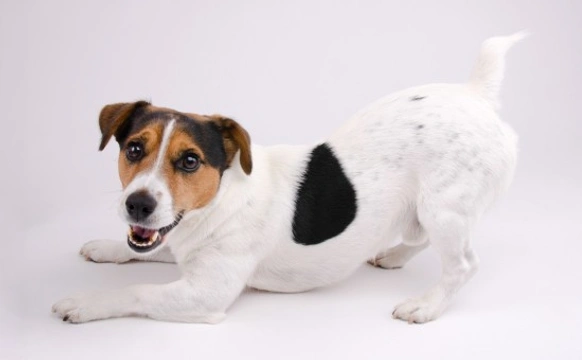
Ten training tips for the Jack Russell
The Jack Russell really is a unique little dog, and they pack large personalities into their small bodies! They are both highly intelligent and very active, always looking for things to do (or ways to get into trouble!) and require clear, consistent training and ongoing management.
Incorrectly managed, the Jack Russell can soon prove unruly and problematic, something that many first time Jack Russell owners overlook, not expecting such a small dog to be as challenging as they can be!
If you own a Jack Russell dog, have just got a new puppy or are considering buying a Jack Russell, read on for ten training tips to help you to manage your little canine powerhouse!
1. Start training immediately
As soon as you get your Jack Russell of any age home, start their training almost immediately. This not only means teaching your dog about the basic commands, but also establishing to them the boundaries of what they are and are not allowed to do, for instance, sleeping on the beds or climbing onto the sofa.
Jack Russells are fast learners, and should pick up the basic commands within a couple of weeks, and they will also generally be willing and capable of learning many other commands too.
2. Give your dog enough affection
While there is much more to keeping a happy dog than love alone, it is one thing they cannot do without! The Jack Russell is a loving and personable dog, so make sure that you show them enough affection, let them know that they are loved, and take the time to bond with them.
3. Do not neglect socialisation
Jack Russells are plucky little dogs, which are normally confident around others and not prone to being pushed around, despite their size! Good socialisation is vital for Jack Russells, to teach them about appropriate interactions with other dogs, and how to play nicely with others. Jack Russells will not necessarily segue the alpha role to bigger dogs in social situations, and if incorrectly socialised, can become little terrorists and bully other dogs, regardless of their size!
4. Know the signs of alpha behaviour
The bold, fearless Jack Russell is one of the small dog breeds that is likely to try to take the alpha role within the household if given half a chance! Proper training and management is the way to avoid this, but it is also important to recognise the signs of a potential bid for dominance in your dog, such as snappy behaviour, growling and resource guarding.
Do not let your Jack Russell pick up bad habits and bad manners, and nip problems in the bud before your dog starts to get established in a position of power.
5. Provide plenty of exercise
Jack Russells may be little and cute, but they are also very active and lively dogs, and need plenty of exercise. They should be walked twice a day at a minimum, and for at least half an hour each time, and their walks should be challenging, active, and give plenty of opportunities for running around.
6. Don’t give your Jack Russell the chance to get bored
Jack Russells are intelligent dogs that do not thrive if they do not receive enough stimulation. A bored Jack Russell will soon become a problem, displaying negative behavioural traits and potentially acting out. Destructive behaviour within the home is one of the surest signs of a bored Jack Russell, so ensure that you spend enough time with your dog, and that they have enough toys to occupy themselves with when alone.
7. Be consistent
Consistency is the key to good training and good behaviour, and is especially important with dogs such as the Jack Russell, who rarely miss an opportunity to get their own way!
Keep your rules fair and consistent and do not break them, and keep your responses and interactions with your dog predictable and reasoned.
8. Don’t underestimate what your Jack Russell is capable of
Jack Russells are able to retain a wide range of training commands, so don’t stop at just the basics! You may be able to teach your Jack Russell to do tricks, follow complex chain commands, and even bring you your slippers! Jack Russells are also excellent at canine sports too, so think about trying your hand at something like agility or flyball to really let your Jack Russell show what they are capable of.
9. Understand their natural behaviours
Jack Russells are hunting dogs, and this means that they might try to pursue smaller animals when out on walks. Work with your Jack Russell from a young age to teach them good recall and not to chase, and accept and plan ahead for the behaviours of your dog when you are out walking.
10. Don’t forget they are dogs!
The Jack Russell is really the least likely little dog to let you forget that they are actually dogs, and they do not thrive on being babied or treated like a pampered child. However, it is always important to be mindful of this fact anyway, and not pander to the fact that your dog is small when training and managing them. They should walk on the lead to heel just like any larger dog, and should not be carried round everywhere or lifted out of the way when larger dogs pass.
Treat your Jack Russell like the challenging, plucky little dogs that they are, and they are sure to thrive!



